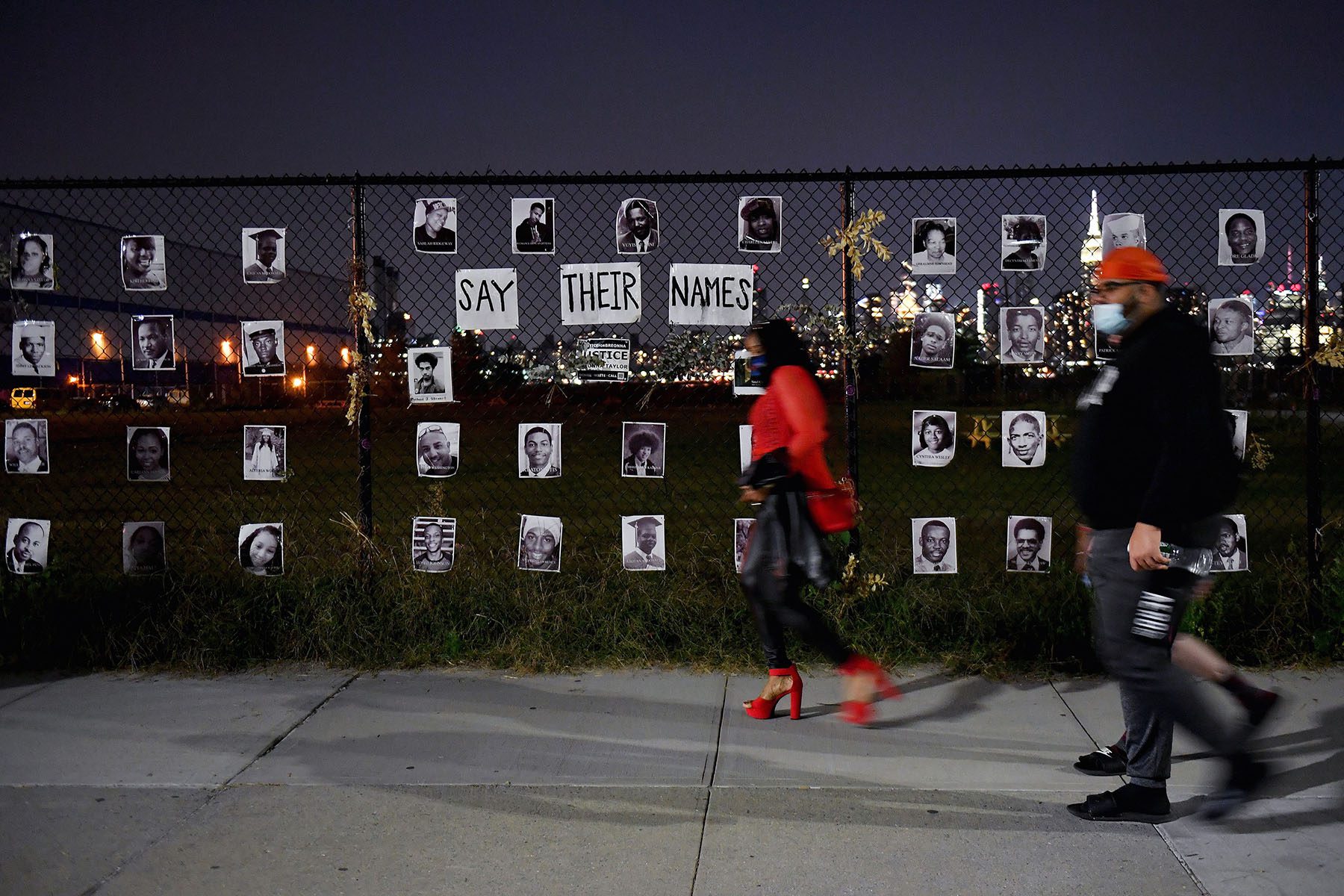It has been four years and 10 days since Ellen Trawick’s son Kawaski was killed by a New York City police officer in his apartment.
Trawick told The 19th that since that time, she’s unsure whether anything has changed. The two officers who entered the apartment without consent in 2019 before tasing and shooting Kawaski Trawick, a Black gay man, still remain with the department. No criminal charges have been filed against them. But today, after years of effort to keep her son’s story in front of public officials, Ellen Trawick is hopeful for some sense of closure as the officers face a disciplinary trial.
“I’m feeling nervous and a little stressed because of the delays that have come up, but I am looking forward to getting some accountability for Kawaski,” Ellen Trawick told The 19th a few days before the trial began. “The time that we have been waiting to get accountability is hard and stressful for our family because it shouldn’t have taken this long.”
On Monday a disciplinary trial began for NYPD Officers Brendan Thompson and Herbert Davis that could result in their removal from the department. At the time of Kawaski Trawick’s killing, the 32-year-old lived in a supportive housing facility in the Bronx meant to help people at risk of experiencing homelessness or mental health challenges.
Video and a ProPublica investigation released in December 2020 — 20 months later — showed Kawaski Trawick walking up to his apartment door holding a bread knife and a stick. He pats his pockets looking for his keys, which he is unable to find. He walks away and returns 15 minutes later with firefighters who let him into his apartment, according to the video obtained by ProPublica.
A report from the Office of the Bronx District Attorney indicates that neighbors expressed concern about Kawaski Trawick, and building security called the police. Minutes after being let into his apartment, the video shows two officers knocking on his door, before one pushes the door open. Over 112 seconds, the officers exchanged words with him, and in that exchange he asks, “Why are you in my home?” Multiple times Kawaski Trawick tells the officers that he’s cooking when they tell him to drop the knife and stick.
Ultimately, Thompson is seen firing his taser without warning. When Kawaski Trawick then rushes toward them, Thompson fires his gun four times, hitting him twice.
The Bronx district attorney’s report concluded its office could not prove beyond a reasonable doubt that the officers were not justified in their actions. The report raised Kawaski Trawick’s mental health state as a potential cause for concern for the officers.
Ellen Trawick refutes the narrative she feels has been painted by public officials about her son’s actions, she told The 19th. She did not go into specifics about his mental state, but said, “The NYPD took advantage of the public and let the public see what they wanted them to see to try to create a narrative that Kawaski had done something wrong.”
She continued: “What I do know is that Kawaski was killed in his home while he was cooking. He had not committed a crime.”
Officers Thompson and Davis had both received “crisis intervention” training aimed at de-escalating encounters involving people experiencing challenges with mental health or addiction, according to the district attorney’s report. Davis had received this training three days before the shooting.
“We have seen historically that whenever there is a police killing and a lot of public outrage, the department says, ‘Oh, we’re going to re-train officers.’ But then the same thing happens again, and again and again,” said Yul-san Liem, a representative of the Justice Committee, a group that advocates against police violence and works with the families of people killed by police.
“From our perspective, training and the promise to retrain, is really just the administration in the NYPD deflecting calls for true accountability,” Liem added.
In June 2021 New York City’s Civilian Complaint Review Board, the civilian oversight agency of the NYPD, voted to substantiate misconduct charges against Thompson and Davis. Those non-criminal charges, which include excessive force, abuse of authority and failure to obtain medical treatment will now be prosecuted by the board before Rosemarie Maldonado, the NYPD’s deputy commissioner of trials.
Last week Maldonado dismissed the illegal entry charge against them. Ultimately, Police Commissioner Keechant Sewell will have the final authority on whether the officers face discipline.
Days before the administrative trial for Kawaski Trawick’s case, another resident of a Bronx supportive housing facility was reportedly shot by NYPD officers while holding scissors and a kitchen knife.
This trial and the concerns it raises about officer crisis response come amid a broader discussion about the direction of New York Mayor Eric Adams, a former police officer who entered office in January 2022. In November, Adams sparked backlash for a directive permitting the involuntary hospitalization of mentally ill people even if they do not pose a threat. Research indicates that women, people of color and LGBTQ+ people experience higher rates of mental illness largely due to social and systemic inequities.
Since the announcement of this directive, Adams’ administration has also introduced a larger mental health agenda that includes services aimed at youth suicide prevention. In February, Trawick submitted testimony to the New York City Council calling on them to oppose Adams’ hospitalization effort.
“From Kawaski’s story — it’s so clear — New York City’s health care system and the NYPD do not see Black people as humans,” she wrote in February. “Police have no business being involved in mental health response, yet Mayor Adams is giving them more power in this area.”
In her interview with The 19th, Trawick acknowledged the long list of mothers before her who have faced similar tragedies, including Iris Baez, mother of Anthony Baez, who was killed by an NYPD officer in 1994, and Gwen Carr, mother of Eric Garner, killed by NYPD in 2014.
“They can understand what our family is going through,” she said. “This has been hard, but with the support of my family and with the support of the Justice Committee we’re able to move forward to push for accountability.”
Recommended for you

Insects, filth and force: Advocates say they saw ‘horrific’ conditions in Atlanta jails long before DOJ inquiry





